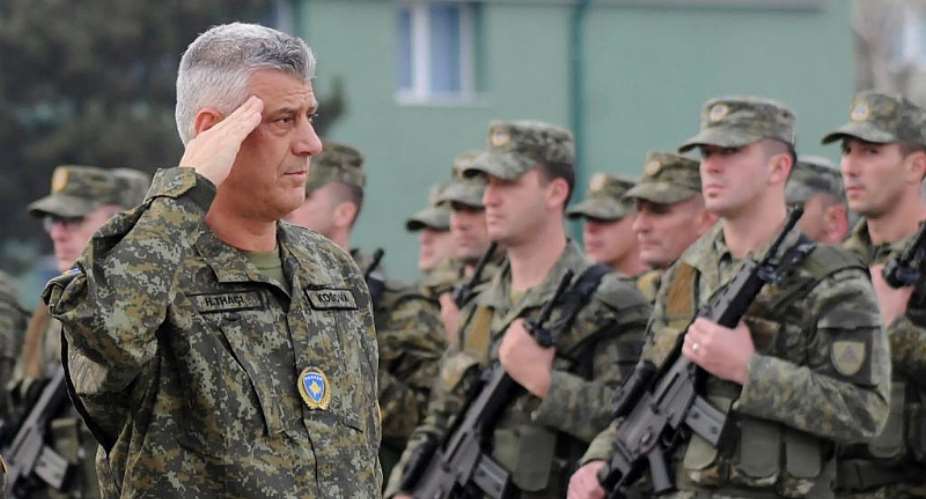The parliament of Kosovo on Friday voted massively in favor of the creation of an army. At the moment, Kosovo has what it is called a 'Security Force' consisting of some 2.500 lightly armed militia. The decision is unilateral, and not received well by either friend or foe.
Kosovo was involved in a bloody civil war with Serbia in the 1990s, when it broke away from what was left of the former republic of Yugoslavia.
It was supported by Nato , which helped the Kosovar Albanians, mainly with air bombardments, against the regime of Slobodan Milosovic in Belgrade.
After the civil war, it was protected by “Bondsteel” a large US military army camp where Nato's Kosovo Force was headquartered.
In 2008, Pristina declared independence, but this was never officially recognized by Serbia and Russia.
One year later created its Kosovo Security Force.
But they felt it was not enough, hence the talk of turning that Security Force into a full blown army.
“Today, the parliament of Kosovo wanted an army for Kosovo,” says Ahmeti Isufi, a member of parliament for the coalition party Alliance for the Future of Kosovo (AAK).
“It is created in support of the international community, especially of the USA, and some countries from Europe.
New army's role?
The new army would serve to “support peace, not just in Kosova, but in the region and other places when it is needed,” he says.
But Kosovo's western allies were not as enthusiastic as Ahmeti.
“We discussed Kosovo's intention to move ahead with the transformation of the Kosovo Security Force into an army,” says Nato Secretary General Jens Stoltenberg.
“Such a move is ill-timed. It goes against the advise of many Nato allies, and may have serious reprecussions for Kosovo's future Euro-Atlantic interaction.”
But Isufi thinks a strong army is what Kosovo needs to have a stronger position in the region.
“It will be relations between two countries, we are neighbors and we think that it is better to continue the dialogue but to support each other to have a good relationship between the two countries.”
Serb reaction
Meanwhile, Serbs blankly reject any notion of a Kosovar army.
“I agree with him that it is very important to keep the dialogue open,” says Mihailo Crnobrnja, the president of the European Movement Serbia.
“But the question is - will the Serbian side participate in the dialogue when the objective of the dialogue is to settle the issue, and then such an important issue as the creation of an army is conducted without any mention in the dialogue?
The fragile relationship between Kosovo and Serbia may suffer irreparable damage, he says.
“Negatively. We need to conduct the dialogue which has been suspended for a number of months. And the first priority should be both for the European Union and for us to re-start the dialogue.
Crnobrnja points to the 100 percent import tax imposed by Kosovo on Serbian goods, “Not five percent, not ten percent, but a hundred percent - the Albanians are going way beyond their agreed contribution to the trade in the area.”
What Crnobrnja doesn't say is that Kosovo took its steps – imposing tariffs and breaking of a diplomatic dialogue – because it accused Serbia, and Russia, of interfering in its attempts to gain a higher profile on the world stage.
And Mr Ahmeti doesn't admit that Kosovo is acting without consent of its allies and supporters, mainly the US, Nato and the EU, thus risking to slow down a long winding process that, they hope, will eventually result in EU membership.
But those ambitions must probably be put on the backburner for now.





 Former Kotoko Player George Asare elected SRC President at PUG Law Faculty
Former Kotoko Player George Asare elected SRC President at PUG Law Faculty
 2024 elections: Consider ‘dumsor’ when casting your votes; NPP deserves less — P...
2024 elections: Consider ‘dumsor’ when casting your votes; NPP deserves less — P...
 You have no grounds to call Mahama incompetent; you’ve failed — Prof. Marfo blas...
You have no grounds to call Mahama incompetent; you’ve failed — Prof. Marfo blas...
 2024 elections: NPP creates better policies for people like us; we’ll vote for B...
2024 elections: NPP creates better policies for people like us; we’ll vote for B...
 Don’t exchange your life for wealth; a sparkle of fire can be your end — Gender ...
Don’t exchange your life for wealth; a sparkle of fire can be your end — Gender ...
 Ghana’s newly installed Poland train reportedly involved in accident while on a ...
Ghana’s newly installed Poland train reportedly involved in accident while on a ...
 Chieftaincy disputes: Government imposes 4pm to 7am curfew on Sampa township
Chieftaincy disputes: Government imposes 4pm to 7am curfew on Sampa township
 Franklin Cudjoe fumes at unaccountable wasteful executive living large at the ex...
Franklin Cudjoe fumes at unaccountable wasteful executive living large at the ex...
 I'll 'stoop too low' for votes; I'm never moved by your propaganda — Oquaye Jnr ...
I'll 'stoop too low' for votes; I'm never moved by your propaganda — Oquaye Jnr ...
 Kumasi Thermal Plant commissioning: I pray God opens the eyes of leaders who don...
Kumasi Thermal Plant commissioning: I pray God opens the eyes of leaders who don...
